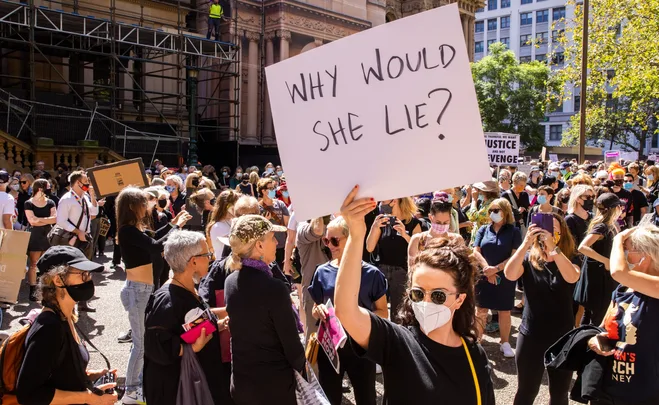Trigger Warning: this article deals with sexual assault and may be triggering to some readers.
An affirmative YES can be heard from all corners of New South Wales today as the Affirmative Consent Bill finally passes the Upper House—the final hurdle that now allows it to be written into law.
The news comes after a lengthy campaign, heavily spurred on by the March 4 Justice protests held across the country earlier this year which saw hundreds of thousands of women and allies call for legislative reform in our laws around sexual violence.
Greens Spokesperson for Women, Jenny Leong MP was at the centre of in-house debates, working tirelessly to enable the law to be passed—she announced the news via Instagram on Tuesday, November 23 with a stirring statement: “That’s it! We did it! This is huge, important, vital reform and will help to deliver justice for survivors of sexual assault.”
She continued: “Thank you to every single one of you who took to the streets to say enough is enough, who wrote letters and emails, who talked to your family and friends about why this reform is so important – this is for you.”
What is the Affirmative Consent Bill?
The Affirmative Consent Bill means it is now a legal requirement for a person to take active steps to ensure they have established whether another person wants to have sex before they engage in the act.
This is particularly significant for the justice process—some victims present the ‘freeze’ response when they are in a situation of fear (as opposed to fight or flight), which means they may be unable to say “no” or “stop” to the perpetrator. Without actively affirming their consent, the perpetrator cannot assume it was given by law.
The Bill will also provide five new jury directions for judges to give at trial to address common misconceptions about sexual assault and behavioural responses, and to ensure the evidence of complainants is assessed fairly.
It will also provide targeted education programs for judges, legal practitioners and police in dealing with victims of sexual assault throughout the judicial process.
The Bill comes after Saxon Mullins bravely came forward to speak out after the man she accused of raping her outside a Kings Cross nightclub in Sydney was acquitted in 2017.
The judge agreed at the time that Mullins had not consented to sex, however her response in the situation to ‘freeze’ provided reasonable grounds for the man to believe she was consenting.
The passing of this new Bill means victims like Saxon could have a much better chance at holding perpetrators accountable in the court of law.
New South Wales Attorney General Mark Speakman also commented on the Bill finally passing its final hurdle.
“I thank victim-survivors, peak bodies, frontline services, legal experts, academics, + those in the criminal justice system for their thorough + thoughtful engagement. I particularly thank survivor [Saxon Mullins]”, he Tweeted.
On October 20, Speakman gave a rousing speech as he introduced the Bill to government: “No one should assume that someone is saying yes just because they don’t say no or don’t resist physically,” he said.
“People are entitled to expect that if someone wants to have sex with them then the other person will ask. If the first person hasn’t said something, or done something, to communicate consent, then that other person will take further steps to ascertain consent. This is just a basic matter of respect.”
Of course, work still needs to be done.
New South Wales now becomes the second Australian state to strengthen its laws around consent after Tasmania.
Earlier this month, Victoria also announced it would overhaul its consent laws with an affirmative consent model set to be adopted in the state by next year.
The decision for reform came after an 18-month examination of the state’s justice system pertaining to sexual offences by the Victorian Law Reform Commission, which gave an alarming total of 91 recommendations to the Victorian government. The key finding? Sexual violence is widespread and heavily under-reported—and that’s across all of Australia.
Today’s announcement in New South Wales is a significant step forward, but as Leong put it: “We don’t stop here. We still need to ensure that everyone—students, teachers, parents, police, judges, prosecutors—understand what consent means.
“We still need proper consent education across the board. Only then can we begin to prevent these assaults from happening in the first place, and ensure that all survivors are given the best chance at receiving justice.”
She concluded: “Today we moved one step closer, and together we will walk on.”
If you are experiencing sexual abuse or other unwanted behaviour, please contact Rape & Domestic Violence Services Australia.










